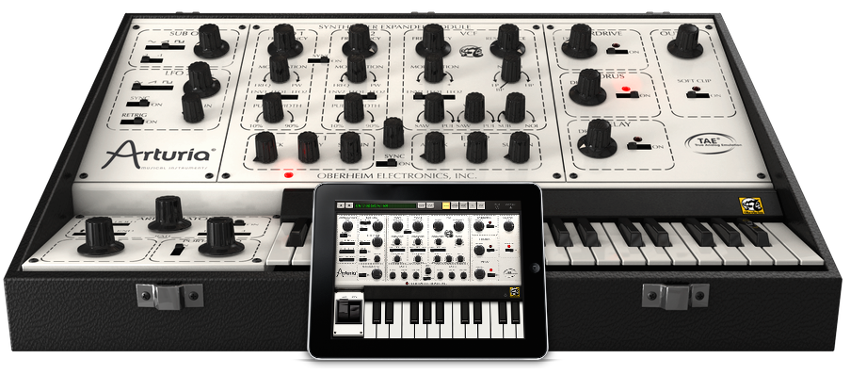 GRENOBLE, FRANCE: music software and hardware developer Arturia is proud to advance its award-winning iSEM — an authentic-sounding software recreation of the trailblazing Seventies-vintage Oberheim Synthesizer Expander Module® (SEM) for Apple’s iPad — as one of the first fully-compatible apps for Apple’s all-new Audio Unit Extensions technology, as of November 19…
GRENOBLE, FRANCE: music software and hardware developer Arturia is proud to advance its award-winning iSEM — an authentic-sounding software recreation of the trailblazing Seventies-vintage Oberheim Synthesizer Expander Module® (SEM) for Apple’s iPad — as one of the first fully-compatible apps for Apple’s all-new Audio Unit Extensions technology, as of November 19…

Apple’s Audio Unit Extensions is an all-new technology in its latest iOS 9 (mobile) and OS X El Capitan (Mac) operating systems that aims to bring the Audio Units (AU) system-level full plug-in architecture model that was previously only available to third-party developers like Arturia in OS X to both OS X and iOS! And Arturia is one of the first third-party developers to enthusiastically embrace its innovative musical advancement with the release of the latest iSEM update. This represents a much more user-friendly experience than the traditional way of interlinking apps using Inter-App Audio or Audiobus, which was the case with previous versions of this award-winning app. According to iSEM development partner Rolf Wöhrmann, “The main difference is that you can now run iSEM from within an app like GarageBand for iPad in much the same way as you would work with standard Arturia plug-ins when running them in desktop- or laptop-based host applications — integrating the great synth sounds of iSEM into your GarageBand projects without leaving the GarageBand app, in other words. By using Audio Unit Extensions-compatible apps like iSEM, GarageBand users can extend its sonic capabilities above and beyond those of the built-in instruments into the wonderful world of Arturia. Indeed, it appears that we are one of the first — if not the first — to support this. That said, iSEM users can now easily record and multitrack their iSEM-based creations within GarageBand, adding drums, voice, guitar, and other sounds to make more complete musical arrangements, if they so wish. It’s also perfectly possible to have multiple instances of iSEM running in GarageBand — at least three or four when using latest-generation iPads, which was impossible with the previous ‘standalone’ version of iSEM.” Truly trailblazing technology, then… in much the same way that the original Oberheim Synthesizer Expander Module® (SEM) was back in its day. How about a little history? Hatched by legendary synth designer Tom Oberheim back in 1974, the dual-oscillator SEM was originally conceived as a way of beefing up weaker-sounding compatible analogue monosynths of the time. It soon became a sought-after sound in its own right, so its Californian creator came up with a series of successive SEM-based instruments, first pairing up two SEMs with a 37-note keyboard and a simple analogue step sequencer to form the Two Voice, Oberheim’s first self-contained compact, duophonic synthesizer in 1975. Polyphonic programmability came courtesy of Oberheim’s breakthrough Polyphonic Synthesizer Programmer which — when hardwired into the fair-sized Four Voice (featuring four SEMs and a 49-note keyboard) in 1976 and enormous Eight Voice (eight SEMs set across two tiers) in 1977 — enabled the control voltages of many parameters for up to eight SEMs to be memorised for the first time. Though these instruments were undeniably groundbreaking, quickly finding favour with the likes of popular prog-rockers Rush and electronic music trailblazers Tangerine Dream, polyphony could only be achieved with multiple SEMs so each voice/module still had to be programmed independently, which was quite a daunting task — even by somewhat shaky Seventies standards! Fast forward to today and the truly twenty-first century musical landscape has changed considerably. So has music technology itself. Indeed, most musicians take polyphony and programmability for granted — though not necessarily that still-sought-after Oberheim sound. Ingeniously, iSEM quite literally taps into all this and more as a cutting-edge iPad app, putting more musicality at anyone’s fingertips than its analogue namesake designer dared dream possible back in Oberheim’s Seventies salad days — all the more so since Arturia has had the foresight to adopt Apple’s Audio Unit Extensions technology so soon after its introduction, and all at a fraction of the cost of Oberheim’s original heavyweight hardware!
iPad 2 (or higher) owners can purchase and directly download the latest version of iSEM from the App Store for €9.99 EURO/$9.99 USD/£7.99 GBP here: https://itunes.apple.com/app/arturia-isem/id673921187?mt=8
For more in-depth information, please visit the iSEM product webpage here: http://www.arturia.com/products/ipad-synths/isem/overview
Listen to several impressive iSEM audio demos here: http://www.arturia.com/products/ipad-synths/isem/media
